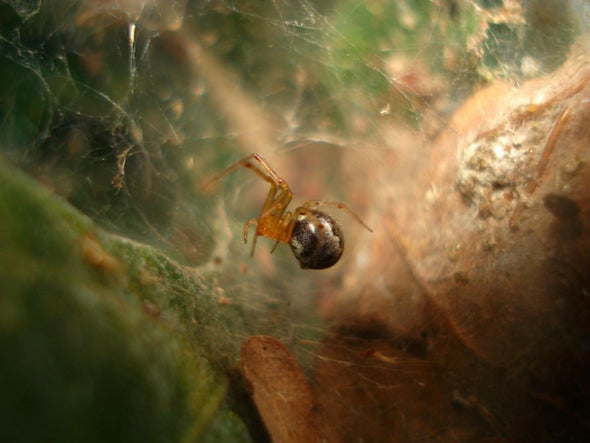(单词翻译:单击)
听力文本
This is Scientific American's 60-second Science, I'm Susanne Bard.
Some scientists stick to the lab. But others brave venomous snakes and downed power lines. Take Jonathan Pruitt, an evolutionary biologist at McMaster University. During last year's hurricane season, he went to the U.S. Southeast to see how extreme weather affects—spiders.
"The goal of this experiment was basically to figure out how rare but extreme events might sculpt the traits of the animals that we see out there in the wild."
The inherent difficulties in doing this kind of work has meant little research into how disasters can be a driving force behind natural selection.
"The only way that I was able to do this was via the assistance of locals who, immediately following these storms, all get into their trucks and drive around to survey the damage of their houses. But they also bring chain saws. And so they will be cutting their way through state roads. And I basically just draft right behind what could be a conga line of F150s with chain saws and use them to cut a path back to my study sites."
All that to survey the habits of tangle-web spiders, which live in colonies above bodies of water.
"And they cooperate into subduing prey together like a tiny, spidery pride of lions."

The spiders come in two personality types: docile and aggressive. Aggressive colonies are prone to cannibalism, fight among themselves and are quick to pounce on their prey. Pruitt found that when aggressive colonies survived a storm, they produced more baby spiders than did their less aggressive counterparts. But in hurricane-free areas, docile colonies had more babies.
"So whether or not it's good to be an aggressive society is contingent on whether or not you're going to have a tropical cyclone strike you or not that year."
Pruitt thinks the difference is due to hurricanes lowering the number of insect prey flying around. He says, of the aggressive spiders: "I think they are good at capitalizing on the limited number of time-sensitive foraging opportunities they have. So when a prey item hits their web, they run out fast, they grab it, it does not get away. And so, under those conditions, we think that's why it pays to be aggressive."
The research is in the journal Nature Ecology & Evolution.
Pruitt says as hurricanes become more common, they could have an outsized impact on the spider's evolutionary trajectory.
"But the fact of the matter is we should not think that what we found in these spiders should be unique to them."
Indeed, climate change could have a stormy future in store for all kinds of animal species.
Thanks for listening for Scientific American — 60-Second Science. I'm Susanne Bard.
参考译文
这里是科学美国人——60秒科学,我是苏珊娜·巴德。
一些科学家坚守在实验室。但也有些科学家勇敢面对毒蛇和倒下的电线。比如麦克马斯特大学的进化生物学家乔纳森·普鲁伊特。去年飓风季,他前往美国东南部地区研究极端天气对蜘蛛的影响。
“这个实验的目标,基本上是弄清罕见但极端事件如何塑造我们在野外看到的动物的特征。”
从事这类工作存在内在困难,因此聚焦灾害如何成为自然选择背后的驱动力的研究很少。
“我能做此事的唯一方法是通过当地人的帮助,他们在风暴过后立即坐上卡车,四处查看房屋受损情况。但他们也会带着电锯。他们将在州际公路上开辟道路。我基本上就是跟在F150汽车队伍的后面,用链锯切出回到研究地点的路。”
这一切都是为了调查球腹蛛的习性,这种蜘蛛生活在水体上方的群落中。
“它们合作制服猎物,就像微型狮群。”
这种蜘蛛有两种性格:温和的和好斗的。好斗的蜘蛛群容易自相残杀、内部争斗、迅速猛扑猎物。普鲁伊特发现,好斗的蜘蛛群在风暴中存活下来后,其产仔数量要多于不那么好斗的同类。但在没有遭遇飓风袭击的地区,温和蜘蛛群繁衍的后代数量更多。
“因此,成为好斗的蜘蛛群是否有益,要取决于那一年它们是否遭遇热带气旋袭击。”
普鲁伊特认为,造成这种差异的原因是飓风减少了到处飞的昆虫猎物的数量。他表示,在好斗蜘蛛群中,“它们善于利用有限的时效性觅食机会。所以,当猎物撞到它们的网上时,它们会迅速跑过去,抓住猎物,让猎物无处可逃。在这些情况下,我们认为这是成为好斗蜘蛛群有益的原因。”
这项研究发表在《自然·生态学与进化》期刊上。
普鲁伊特表示,随着飓风越来越常见,其可能对蜘蛛的进化轨迹产生巨大影响。
“但事实是,我们不应该认为我们在这些蜘蛛身上发现的东西是其所特有的。”
确实,气候变化可能会给所有动物种类带来暴风般的未来。
谢谢大家收听科学美国人——60秒科学。我是苏珊娜·巴德。
译文为可可英语翻译,未经授权请勿转载!
重点讲解
重点讲解:
1. be prone to 有(不好的)倾向的;易于…的;很可能…的;
Tired drivers were found to be particularly prone to ignore warning signs.
据调查,疲劳驾车时特别容易忽视警示标志。
2. be contingent on 取决于…的;由…决定的;
In effect, growth is contingent on improved incomes for the mass of the low-income population.
事实上,发展有赖于大量低收入人群收入的增长。
3. be good at 擅长的;精通的;能干的;
I always was good at amateur theatricals.
我一向擅长业余表演。
4. capitalize on 利用;
The team failed to capitalize on their early lead.
这个队未能充分利用开场时领先的优势。


